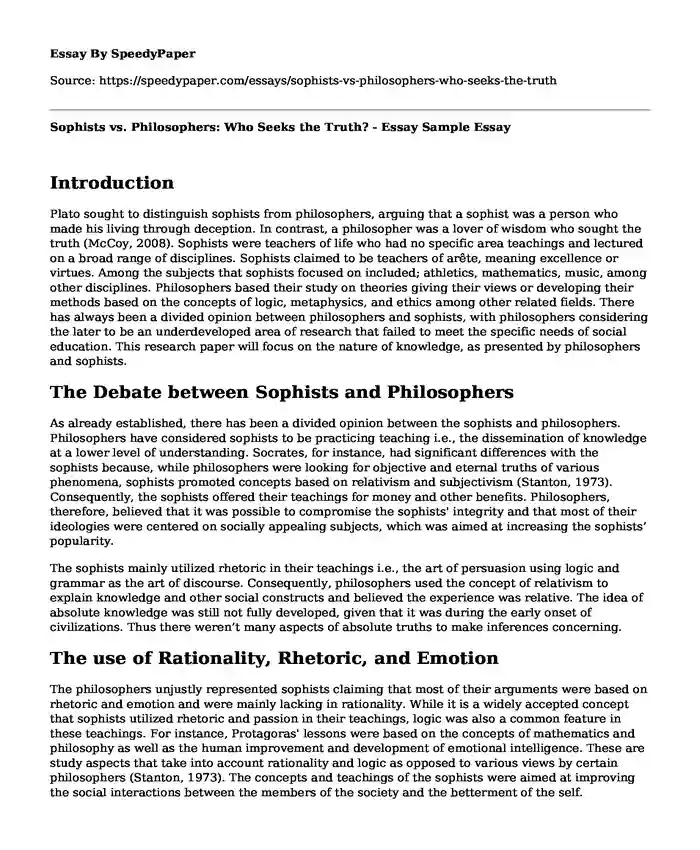
| Type of paper: | Essay |
| Categories: | Philosophy |
| Pages: | 4 |
| Wordcount: | 870 words |
Introduction
Plato sought to distinguish sophists from philosophers, arguing that a sophist was a person who made his living through deception. In contrast, a philosopher was a lover of wisdom who sought the truth (McCoy, 2008). Sophists were teachers of life who had no specific area teachings and lectured on a broad range of disciplines. Sophists claimed to be teachers of arête, meaning excellence or virtues. Among the subjects that sophists focused on included; athletics, mathematics, music, among other disciplines. Philosophers based their study on theories giving their views or developing their methods based on the concepts of logic, metaphysics, and ethics among other related fields. There has always been a divided opinion between philosophers and sophists, with philosophers considering the later to be an underdeveloped area of research that failed to meet the specific needs of social education. This research paper will focus on the nature of knowledge, as presented by philosophers and sophists.
The Debate between Sophists and Philosophers
As already established, there has been a divided opinion between the sophists and philosophers. Philosophers have considered sophists to be practicing teaching i.e., the dissemination of knowledge at a lower level of understanding. Socrates, for instance, had significant differences with the sophists because, while philosophers were looking for objective and eternal truths of various phenomena, sophists promoted concepts based on relativism and subjectivism (Stanton, 1973). Consequently, the sophists offered their teachings for money and other benefits. Philosophers, therefore, believed that it was possible to compromise the sophists' integrity and that most of their ideologies were centered on socially appealing subjects, which was aimed at increasing the sophists’ popularity.
The sophists mainly utilized rhetoric in their teachings i.e., the art of persuasion using logic and grammar as the art of discourse. Consequently, philosophers used the concept of relativism to explain knowledge and other social constructs and believed the experience was relative. The idea of absolute knowledge was still not fully developed, given that it was during the early onset of civilizations. Thus there weren’t many aspects of absolute truths to make inferences concerning.
The use of Rationality, Rhetoric, and Emotion
The philosophers unjustly represented sophists claiming that most of their arguments were based on rhetoric and emotion and were mainly lacking in rationality. While it is a widely accepted concept that sophists utilized rhetoric and passion in their teachings, logic was also a common feature in these teachings. For instance, Protagoras' lessons were based on the concepts of mathematics and philosophy as well as the human improvement and development of emotional intelligence. These are study aspects that take into account rationality and logic as opposed to various views by certain philosophers (Stanton, 1973). The concepts and teachings of the sophists were aimed at improving the social interactions between the members of the society and the betterment of the self.
Philosophers use the concept of intellect and scientific methods to come up with clearly thought out and explained ideologies. These inferences are based on natural observations and studies that apply rational thought processes and logic to ascertain the nature of the information contained herein. While the philosophers' approach is logical and uses more accurate scientific methods, it doesn't discredit the sophists’ outlook. It approaches on social knowledge through the application of rhetoric and emotion in their teachings set systems of the development of a better understanding of social order.
The Method in Philosophy
The method in philosophy was another major cause of the divide in the rift between sophists and philosophers. While sophists lacked a particular basis for their teachings and generalized on arête i.e., excellence and virtues, the philosophers used the method in philosophy to establish the necessary foundation frameworks of the discipline. Therefore, the methodological approach in philosophical studies has been used to determine the validity of various studies in this discipline. This enhanced the credibility of philosophy as a discipline compared to other related fields such as sophism (Stanton, 1973).
Basing their arguments on such concepts, philosophers such as Plato and Socrates were able to dismiss the sophists as a conniving people who taught concepts that were mainly oriented their gains rather than for the good of the society. However, this may not be taken as the situation of the ground as it has already been established that sophists based their studies on more than emotion and rational thoughts, logic, and other aspects were also taken into consideration, thus making the philosophers claim lesser effective.Conclusion
From the above-presented evidence, sophists have indeed been unjustly represented by the philosophers in most of their studies. While I may be considered to be interdisciplinary supremacy battles between scholars in the two fields, it is true that the sophists also made reasonable claims and arguments in their line of study. This may be considered like the modern-day professional rifts e.g., where doctors may look down on nurses as being less qualified. However, such observations fail to hold ground given that every individual is entitled to their ideologies and opinions provided they are based on proven scientific methods.
References
Stanton, G. R. (1973). Sophists and philosophers: problems of classification. The American Journal of Philology, 94(4), 350-364.
McCoy, M. (2008). Plato on the Rhetoric of Philosophers and Sophists.
Cite this page
Sophists vs. Philosophers: Who Seeks the Truth? - Essay Sample. (2023, Sep 13). Retrieved from https://speedypaper.com/essays/sophists-vs-philosophers-who-seeks-the-truth
Request Removal
If you are the original author of this essay and no longer wish to have it published on the SpeedyPaper website, please click below to request its removal:
- Philosophy Essay Example on Nietzsche's Definition of Truth
- Free Essay: Jonathan Livingstone Seagull and Allegory of the Cave
- Essay Example on Gertler's Philosophy
- Free Essay on Philosophy Questions
- Descartes' 'Method of Doubt', Essay Sample in Philosophy
- Philosophy Essay Example: Theory of Forms by Plato and Aristotle
- Essay Sample on Animal Ethics
Popular categories




